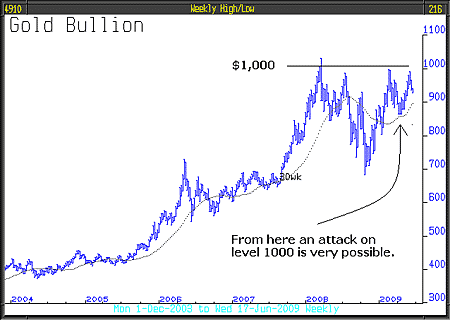Get the latest financial news, insights and expert analysis from our award-winning MoneyWeek team, to help you understand what really matters when it comes to your finances.
You are now subscribed
Your newsletter sign-up was successful
Want to add more newsletters?

Twice daily
MoneyWeek
Get the latest financial news, insights and expert analysis from our award-winning MoneyWeek team, to help you understand what really matters when it comes to your finances.

Four times a week
Look After My Bills
Sign up to our free money-saving newsletter, filled with the latest news and expert advice to help you find the best tips and deals for managing your bills. Start saving today!
It used to be very difficult to own gold. Today, that has all changed, it just gets easier to buy. By using Exchange Traded Funds (ETFs) you can own any amount of gold securely and many investors select that option.
If you want the real thing, it's a bit more complicated, except in Germany. T GGold-Super-Markt, a company based in Stuttgart, intends to place what look like chocolate vending machines in 500 locations. For €30 you buy a one-gramme wafer of gold, or a larger ten-gramme bar for €245. The first experimental machine has been installed at Frankfurt airport. Extraordinary, but true. In Switzerland it's possible to buy gold bullion at the post office how about that!
As we have reported before, the ownership of gold relative to global wealth is very small compared to historical comparisons, so the potential for a big move will not go away particularly whilst the fear of dollar weakness persists and the global credit crisis continues. In fact, if you were writing a book of fiction trying to invent global economic conditions favourable for the gold price to fly, you might well come up with today's mess, except it might be too unbelievable that so many major banks would, all on their own, cause such financial mayhem.
MoneyWeek
Subscribe to MoneyWeek today and get your first six magazine issues absolutely FREE

Sign up to Money Morning
Don't miss the latest investment and personal finances news, market analysis, plus money-saving tips with our free twice-daily newsletter
Don't miss the latest investment and personal finances news, market analysis, plus money-saving tips with our free twice-daily newsletter
In common with others, we have long thought that $2,000/oz was a reasonable expectation - although some say much higher. In real terms, a bit over $2,000/oz is no different than the 1980 high of $850/oz.
If gold is going to $2,000/oz, first it must get above $1,000/oz. As can be seen by the chart below, so far the price has failed to do this four times.

Such failures, when overcome, generally lead to very big moves; historically, the longer the resistance resists, once exceeded the bigger is the move that takes place. In order to get through this key level, the assault needs to start close to hand. So February's rally to almost $1,000/oz and the modest pullback since possibly sets gold up for that to happen. It wouldn't take much of a run from here to get through the, so far, impenetrable level of $1,000.
For gold it's a nervous but exciting period where the prize is just huge.
The important conditions relating to emerging markets underpin the energy and commodity markets. The chief executive of BP, Tony Haywood, has recently confirmed that in 2008, for the first time ever, non-OECD nations' energy consumption of 5,787 million tonnes, up 4.2%, was greater than OECD nations' energy consumption of only 5,508 million tonnes, down 1.3%.
Oil is a finite resource currently subject, since last year, to an abandonment of exploration and investment by oil producers. There will be an inevitable rise in demand as emerging economies gather more momentum. For example, only last week it was reported that, in May, car sales in China were up 34% compared to a year ago.
We see the commodity sector of the investment landscape as a major opportunity for many years ahead.
This article was written by Full Circle Asset Management, as published in the threesixty Newsletter on 19 June 2009.
Get the latest financial news, insights and expert analysis from our award-winning MoneyWeek team, to help you understand what really matters when it comes to your finances.
MoneyWeek is written by a team of experienced and award-winning journalists, plus expert columnists. As well as daily digital news and features, MoneyWeek also publishes a weekly magazine, covering investing and personal finance. From share tips, pensions, gold to practical investment tips - we provide a round-up to help you make money and keep it.
-
 How a ‘great view’ from your home can boost its value by 35%
How a ‘great view’ from your home can boost its value by 35%A house that comes with a picturesque backdrop could add tens of thousands of pounds to its asking price – but how does each region compare?
-
 What is a care fees annuity and how much does it cost?
What is a care fees annuity and how much does it cost?How we will be cared for in our later years – and how much we are willing to pay for it – are conversations best had as early as possible. One option to cover the cost is a care fees annuity. We look at the pros and cons.

